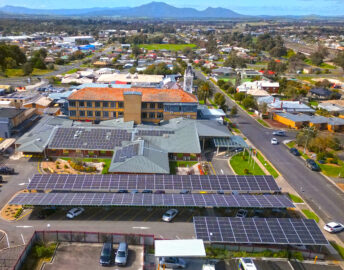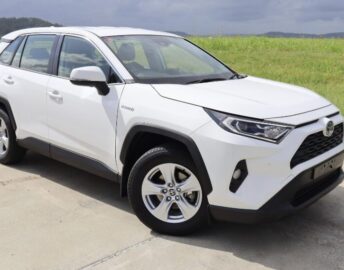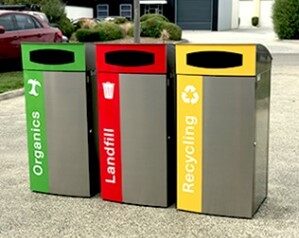Environmental Sustainability
Environmental Sustainability
The Board and staff at East Grampians Health Service recognise that our health system negatively contributes to the carbon footprint.



Energy
Heating, cooling, ventilation and hot water in a health service all require substantial energy use.
Power generation – our action
- A roof top and car park shelter solar project meant that there are now 1,322 panels across both the Ararat and Willaura campus with a combined solar system of 492 kW.
- This increased our self-generated energy from 370.64 MHw in 2021/2022 to a peak of 530.41 MHw in 2022/2023.
Transportation energy – our action
- Changes to our fleet vehicle practices has led to 21 extended range hybrid vehicles joining the fleet in 2023/2024, representing 38% of all EGHS road vehicles.
- There has been a drop in total greenhouse gas emissions from vehicle fleet from 136.39 tonnes CO2-e in 2022/2023 to 104.26 tonnes CO2-e in 2023/2024.
Water
Health services are often high users of water across many parts of their operations.
Water – our action
- Ongoing efforts to reduce water use such as changes to both our source of water (e.g. use of tank water when washing fleet cars) and eliminating use (e.g. surgical scrubbing with alcohol-based rub rather than water) has led to a drop in total water use from 1 water unit per floor space (kL/m2) in 2022/2023 to 0.67 water unit per floor space (kL/m2) in 2023-2024.
Waste
Manufacturing replacements for disposable items like surgical equipment, blood pressure cuffs and bed linen generate many emissions. The incineration of these disposed items – which is widely practised – can also release air pollutants.
Increased recycling – our action
- An increased focus on correct use of the various waste streams has contributed to an increase in the percentage of our waste that is recycled from 33.1% in 2022/2023 to 36.7% in 2023-2024.
- Total waste recycled and reused per patient treated (kg/patient treated) has also increased from 1.63 in 2022/2023 to 1.77 in 2023-2024.
Reducing single use items – our action
We are reviewing the use of single use items such at heat packs and tourniquets and considering re-usable options.
We are examining our practices across different parts of parts of our operations.
Initiatives such as encouraging the use of ‘Keep-cups’ and crockery for items purchased from Café Pyrenees have led to reductions in container use.
See the Environmental Management Plan 2024-2027 for detail of all the EGHS initiatives as well at the EGHS Annual Report for further environmental performance data.
 (03) 5352 9300IN AN EMERGENCY CALL 000
(03) 5352 9300IN AN EMERGENCY CALL 000



